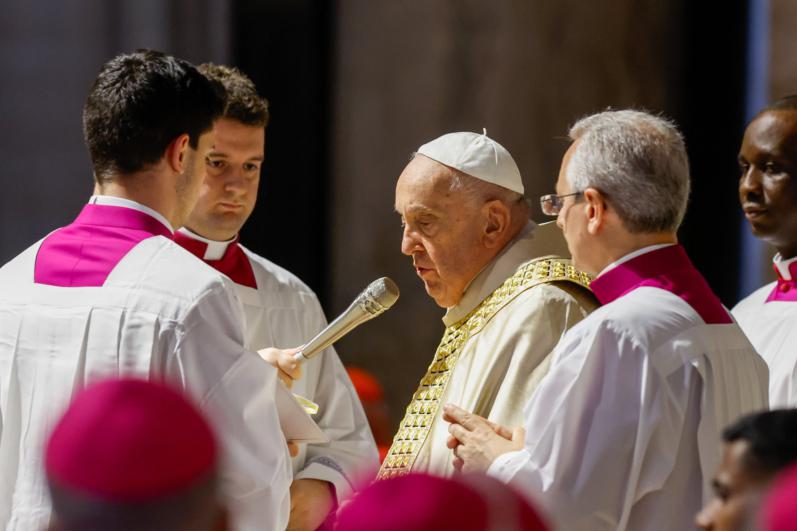Holy Year 2025 holds ecumenical promise, pope says
VATICAN CITY (CNS) -- Pope Francis' document proclaiming the Holy Year 2025 draws special attention to the ecumenical possibilities of the celebration, especially since the jubilee coincides with celebrations of the 1,700th anniversary of the Council of Nicaea.
The council, which began meeting in May 325, gave birth to the Nicene Creed, affirmed the full divinity of Christ and set a formula for determining the date of Easter.
"The Council Fathers chose to begin that Creed by using for the first time the expression 'We believe,' as a sign that all the Churches were in communion and that all Christians professed the same faith," the pope wrote in "Spes Non Confundit," ("Hope Does Not Disappoint"), his document formally calling for the jubilee celebration.
The document was published by the Vatican May 9 and excerpts of it were read in front of the Holy Door of St. Peter's Basilica.
While the document focuses on the Catholic celebration of the holy year and what Catholics can do to celebrate it, Pope Francis also expressed hope for the participation of other Christian churches and communities in the celebration and highlighted the coincidence of the Nicaea commemorations.
Throughout Pope Francis' pontificate, he has spoken about the "ecumenism of martyrs" or the "ecumenism of blood" -- a reference to the killing of Christians without regard for the denomination to which they belong.
Last July, he set up the "Commission of the New Martyrs -- Witnesses of the Faith" in the Dicastery for the Causes of Saints to draw up a list of Christians killed for their faith since the year 2000.
"The martyrs, coming as they do from different Christian traditions, are also seeds of unity, expressions of the ecumenism of blood," the pope wrote in his proclamation of the holy year. "I greatly hope that the Jubilee will also include ecumenical celebrations as a way of highlighting the richness of the testimony of these martyrs."
A common baptism and a shared belief in the faith statements in the Creed are at the foundation of efforts to restore Christian unity.
The Council of Nicaea, the pope said, sought to preserve that unity when it was "seriously threatened by the denial of the full divinity of Jesus Christ and hence his consubstantiality with the Father."
"The Council of Nicaea was a milestone in the Church's history," Pope Francis wrote. "The celebration of its anniversary invites Christians to join in a hymn of praise and thanksgiving to the Blessed Trinity and in particular to Jesus Christ, the Son of God, 'consubstantial with the Father,' who revealed to us that mystery of love."
"At the same time," the pope said, the anniversary is a "summons to all Churches and Ecclesial Communities to persevere on the path to visible unity and in the quest of fitting ways to respond fully to the prayer of Jesus 'that they may all be one. As you, Father, are in me and I am in you, may they also be in us, so that the world may believe that you have sent me.'"
Different Christian communities celebrated Easter on different days until the Council of Nicaea decided that for the unity of the Christian community and its witness, Easter would be celebrated on the first Sunday after the first full moon after the spring equinox.
But the Julian calendar, which is what Christians used in the fourth century and many Orthodox churches still use, was out of sync with the actual solar year, so March 21 -- generally assumed to be the date of the northern hemisphere's spring equinox -- gradually "drifted" away from the actual equinox.
In 1582, Pope Gregory XIII, relying on the work of astronomers, reformed the calendar, dropping 10 days and making the equinox fall on March 21 again. Today Catholics and most Christians in the West follow the Gregorian calendar.
But, in another coincidence, Easter will fall on the same day on the Julian and Gregorian calendars in 2025.
Pope Francis prayed that the coincidence would "serve as an appeal to all Christians, East and West, to take a decisive step forward toward unity around a common date for Easter. We do well to remind ourselves that many people, unaware of the controversies of the past, fail to understand how divisions in this regard can continue to exist."



















